A scale drawing of an object is the same shape at the object but a different size. The scale of a drawing is a comparison of the length used on a drawing to the length it represents. The scale is written as a ratio. The ratio of two corresponding sides in similar figures is called the scale factor.
Scale factor= length in image / corresponding length in object.
If one shape can become another using revising, then the shapes are similar. Hence, two shapes are similar when one can become the other after a resize, flip, slide or turn. In the photograph below showing the side view of a train engine. Scale factor is 1:200.
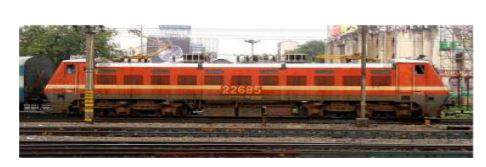
This means that a length of 1 cm on the photograph above corresponds to a length of 200cm or 2 m, of the actual engine. The scale can also be written as the ratio of two lengths.
What will affect the similarity of any two polygons?
They are flipped horizontally
They are dilated by a scale factor
They are translated down
They are not the mirror image of one another.
The correct Answer is:D
Step by step video & image solution for A scale drawing of an object is the same shape at the object but a different size. The scale of a drawing is a comparison of the length used on a drawing to the length it represents. The scale is written as a ratio. The ratio of two corresponding sides in similar figures is called the scale factor. Scale factor= length in image / corresponding length in object. If one shape can become another using revising, then the shapes are similar. Hence, two shapes are similar when one can become the other after a resize, flip, slide or turn. In the photograph below showing the side view of a train engine. Scale factor is 1:200. This means that a length of 1 cm on the photograph above corresponds to a length of 200cm or 2 m, of the actual engine. The scale can also be written as the ratio of two lengths. What will affect the similarity of any two polygons? by Physics experts to help you in doubts & scoring excellent marks in Class 10 exams.
Topper's Solved these Questions
- BOOK - CBSE MODEL PAPERCHAPTER - QUESTION BANK 2021EXERCISE - COORDINATE GEOMETRY (Case Study 1)5videos
QUESTION BANK 2021
- BOOK - CBSE MODEL PAPERCHAPTER - QUESTION BANK 2021EXERCISE - COORDINATE GEOMETRY (Case Study 2)5videos
QUESTION BANK 2021
- BOOK - CBSE MODEL PAPERCHAPTER - QUESTION BANK 2021EXERCISE - SIMILAR TRIANGLES (CASE STUDY 2)5videos
QUESTION BANK 2021
- BOOK - CBSE MODEL PAPERCHAPTER - PRACTICE PAPER 2022EXERCISE - Multiple Choice Questions60videos
PRACTICE PAPER 2022
- BOOK - CBSE MODEL PAPERCHAPTER - SAMPLE PAPER (MATHEMATICS STANDARD)EXERCISE - PART - B16videos
SAMPLE PAPER (MATHEMATICS STANDARD)
Similar Questions
A scale drawing of an object is the same shape at the object but a different size. The scale of a drawing is a comparison of the length used on a drawing to the length it represents. The scale is written as a ratio. The ratio of two corresponding sides in similar figures is called the scale factor.
Scale factor= length in image / corresponding length in object.
If one shape can become another using revising, then the shapes are similar. Hence, two shapes are similar when one can become the other after a resize, flip, slide or turn. In the photograph below showing the side view of a train engine. Scale factor is 1:200.
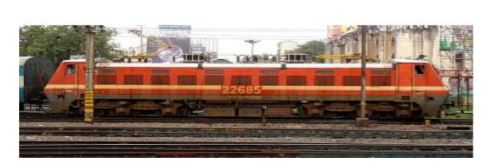
This means that a length of 1 cm on the photograph above corresponds to a length of 200cm or 2 m, of the actual engine. The scale can also be written as the ratio of two lengths.
The length of AB in the given figure:
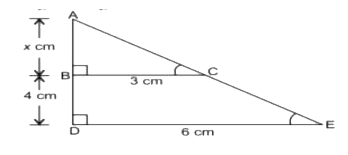 View Solution
View SolutionA scale drawing of an object is the same shape at the object but a different size. The scale of a drawing is a comparison of the length used on a drawing to the length it represents. The scale is written as a ratio. The ratio of two corresponding sides in similar figures is called the scale factor.
Scale factor= length in image / corresponding length in object.
If one shape can become another using revising, then the shapes are similar. Hence, two shapes are similar when one can become the other after a resize, flip, slide or turn. In the photograph below showing the side view of a train engine. Scale factor is 1:200.
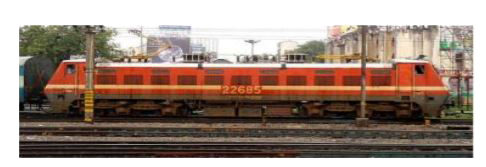
This means that a length of 1 cm on the photograph above corresponds to a length of 200cm or 2 m, of the actual engine. The scale can also be written as the ratio of two lengths.
If two similar triangles have a scale factor 5:3 which statement regarding the two triangles is true?View Solution
Knowledge Check
- Question 1 - Select One
The length of a rod is measured as 35.3cm then the graduations on the scale are up to
A1 cmB1 mmC0.01mmD0.1 mm
A scale drawing of an object is the same shape at the object but a different size. The scale of a drawing is a comparison of the length used on a drawing to the length it represents. The scale is written as a ratio. The ratio of two corresponding sides in similar figures is called the scale factor.
Scale factor= length in image / corresponding length in object.
If one shape can become another using revising, then the shapes are similar. Hence, two shapes are similar when one can become the other after a resize, flip, slide or turn. In the photograph below showing the side view of a train engine. Scale factor is 1:200.
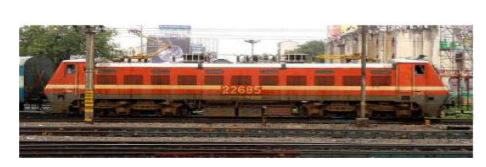
This means that a length of 1 cm on the photograph above corresponds to a length of 200cm or 2 m, of the actual engine. The scale can also be written as the ratio of two lengths.
If the length of the model is 11cm, then the overall length of theengine in the photograph above, including the couplings(mechanism used to connect) is:View SolutionA scale drawing of an object is the same shape at the object but a different size. The scale of a drawing is a comparison of the length used on a drawing to the length it represents. The scale is written as a ratio. The ratio of two corresponding sides in similar figures is called the scale factor.
Scale factor= length in image / corresponding length in object.
If one shape can become another using revising, then the shapes are similar. Hence, two shapes are similar when one can become the other after a resize, flip, slide or turn. In the photograph below showing the side view of a train engine. Scale factor is 1:200.
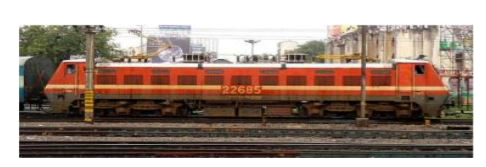
This means that a length of 1 cm on the photograph above corresponds to a length of 200cm or 2 m, of the actual engine. The scale can also be written as the ratio of two lengths.
What is the actual width of the door if the width of the door in photograph is 0.35cm?View SolutionThe Kelvin scale temperature is 0 K. What is the corresponding Celsius scale temperature ?
View SolutionConstruct a triangle similar to a given triangle ABC with its sides equal to 53 of the corresponding sides of the triangle ABC (i.e., of scale factor 53)
View SolutionYou are provided three scales A, B and C as shown in Fig. 10.6 to measure a length of 10 cm.
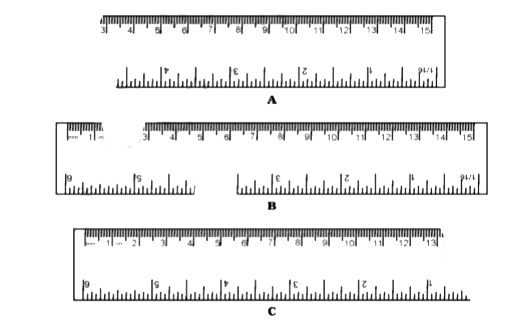
For the correct measurement of the length you will use the scaleView SolutionThe length of one's wrist can be measured by using metre scale.
View SolutionThe actual length of a painting was 2 m. What is its length in the photograph if the scale used is 1 mm : 20 cm.
 View Solution
View Solution

